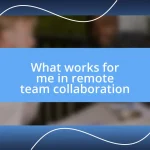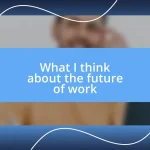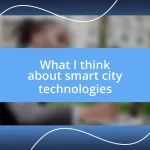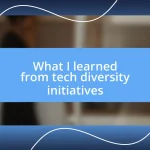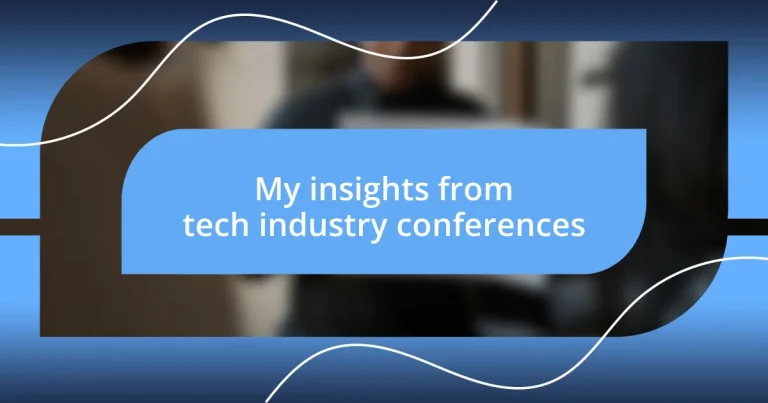Key takeaways:
- Networking opportunities at tech conferences lead to collaborations, mentorships, and career advancements.
- Key themes emerging from recent conferences include sustainability, mental health, and the ethical implications of AI.
- The future of tech conferences will focus on hybrid formats, interactivity, and community-building to enhance participant engagement.
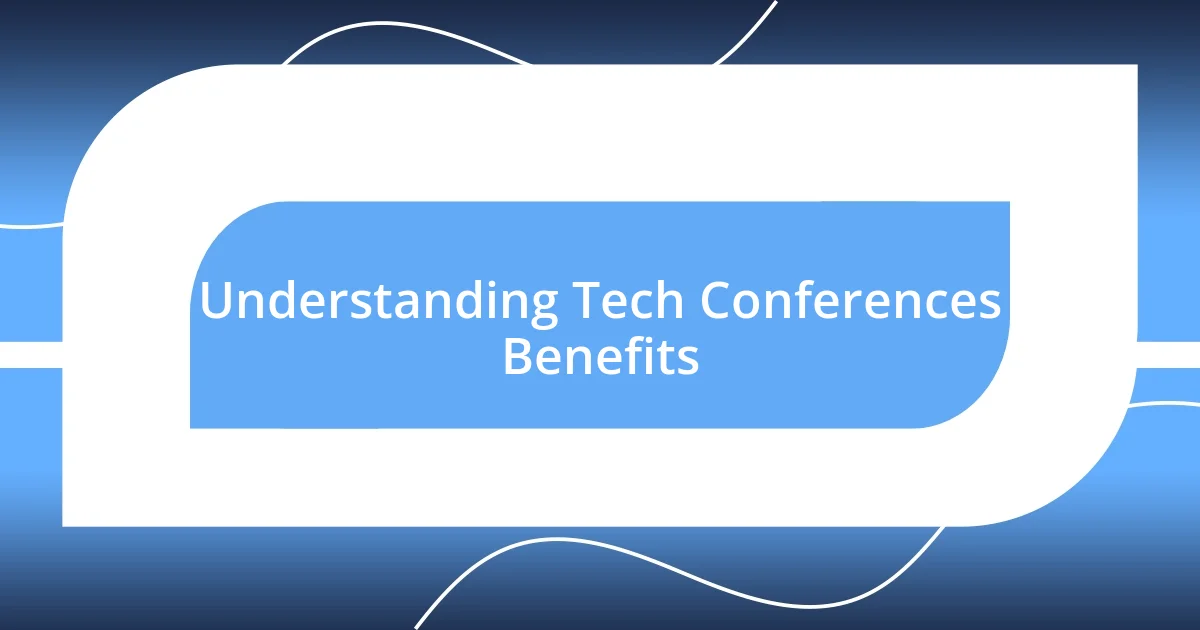
Understanding Tech Conferences Benefits
Attending tech conferences has been a game-changer for me. I remember my first one vividly; the energy in the room was palpable. It wasn’t just about the presentations; it was the spontaneous conversations over coffee breaks that led to collaborations I never imagined.
One of the greatest benefits I’ve discovered is the opportunity to network with industry leaders and innovative thinkers. Have you ever found yourself in a conversation that sparks a new idea or a project? I have, and it’s incredibly thrilling. These interactions often lead to mentorship opportunities that can profoundly influence your career path.
Moreover, the chance to gain insights from the latest trends and technologies is invaluable. At one conference, I attended a session that introduced a technology I had never encountered before. It felt like a lightbulb moment; I realized how it could significantly enhance my work. The knowledge gained at these events isn’t simply theoretical; it can be transformative, personally and professionally.
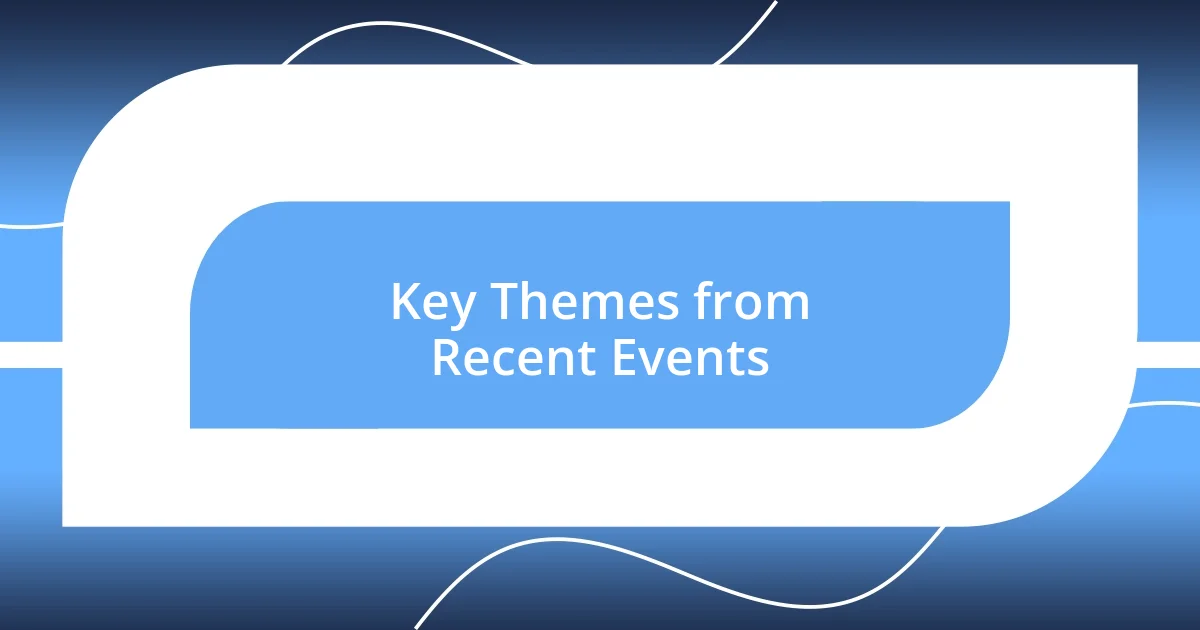
Key Themes from Recent Events
Recent tech conferences have illuminated a few crucial themes that resonate deeply within the industry. One standout theme is the increasing emphasis on sustainability in technology. I recall attending a panel discussion where experts shared their innovative approaches to reducing the carbon footprint of tech products. It was inspiring to see how passion for environmental responsibility was leading tangible changes in product design and corporate policies.
- Sustainability: Exploring eco-friendly technologies and corporate responsibility.
- Remote Collaboration Tools: A surge in demand for tools enabling effective remote work, sparking fresh developments.
- AI and Automation: Discussions around the ethical implications and transformative potential of AI technologies.
- Diversity and Inclusion: The push for more inclusive practices in hiring and company cultures, creating richer environments for innovation.
Another theme that stood out was the importance of mental health in the tech industry. In one session, a speaker opened up about their experiences with burnout, which resonated with many in the audience. Sharing personal stories around mental health fosters a supportive community, emphasizing that it’s okay to seek help and prioritize well-being amidst the fast-paced nature of the tech landscape.
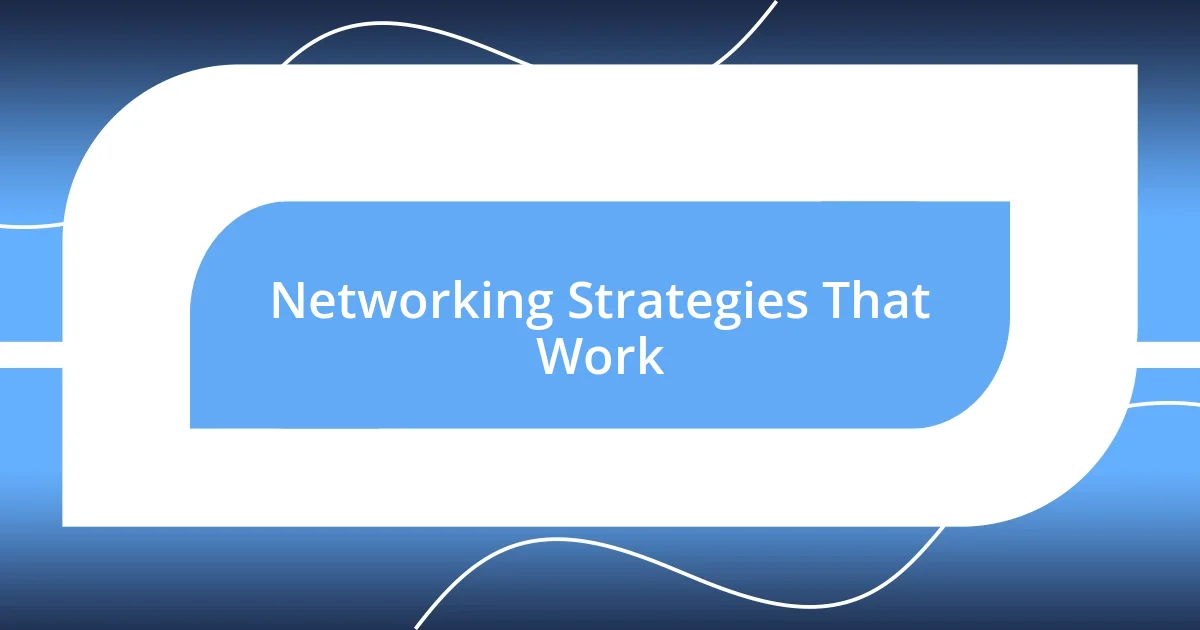
Networking Strategies That Work
Networking is essential in the tech industry, and I’ve discovered some strategies that truly resonate with me. One effective approach is to leverage social media platforms like LinkedIn even before the event. I often share that I’ll be attending conferences, which opens doors for connecting with others who are going. Last year, I posted a simple question about who else would be there, and it sparked a conversation that turned into a dinner meet-up during the conference.
Another strategy that works well for me revolves around being proactive in engaging with speakers and panelists. After a session that blew me away, I made it a point to approach the speaker during the Q&A. Not only did I express my appreciation for their insights, but I also asked a question that led to an amazing dialogue. This kind of personal interaction can create lasting relationships, and I still connect with them on various platforms to share updates and ideas.
Lastly, I’ve found that casual networking—like attending after-parties or social events—can be just as fruitful. The informal setting allows for authentic conversations. I once met someone at a relaxed gathering while exchanging stories about our first coding projects, and it evolved into a collaboration that has influenced my current work significantly. These moments remind me that networking isn’t solely about business cards; it’s about establishing genuine connections that can lead to extraordinary opportunities.
| Networking Strategy | Description |
|---|---|
| Leverage Social Media | Use platforms like LinkedIn to announce your attendance and connect pre-conference. |
| Engage with Speakers | Approach speakers with thoughtful questions to create meaningful dialogue. |
| Attend Casual Events | Join after-parties for authentic conversations that can lead to collaborations. |
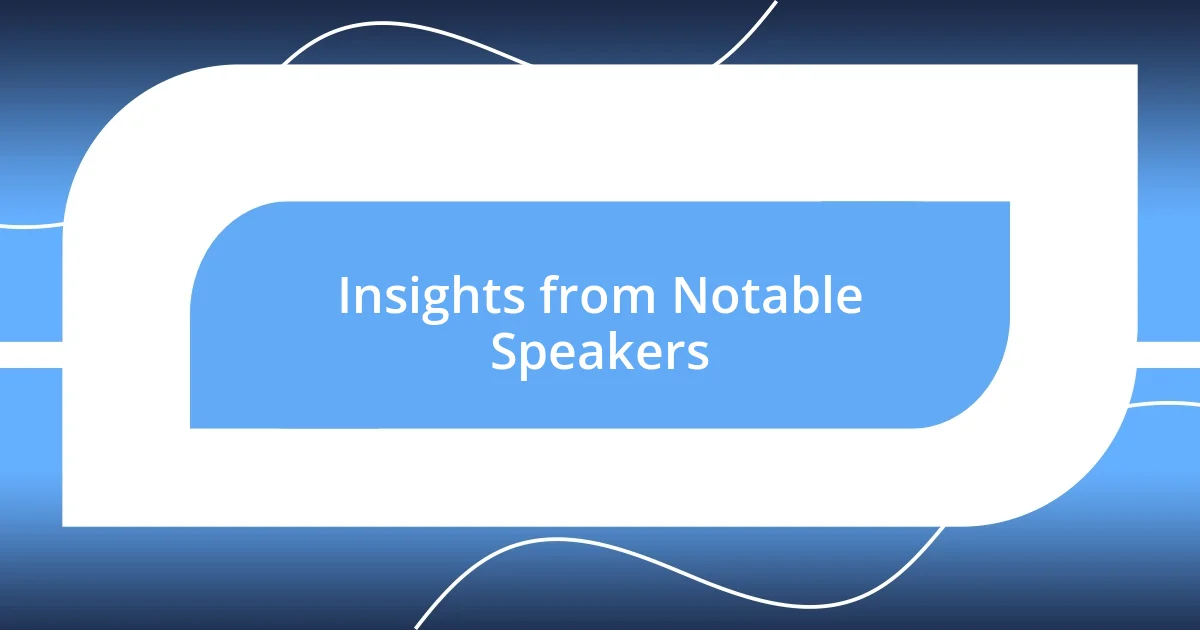
Insights from Notable Speakers
Hearing from notable speakers at tech conferences always leaves me with something to ponder. I remember a speaker once articulating a vision for technology as a “tool for social change,” which struck a chord with me. Their enthusiasm for integrating tech into community improvement initiatives inspired many attendees to rethink how their own work could make a positive impact.
One moment that beautifully encapsulated the power of personal stories was during a keynote on diversity and inclusion. A speaker courageously shared their journey as a minority in tech, detailing the hurdles they faced. I felt the emotions in the room shift; it was a poignant reminder of why these conversations matter. How often do we hear these stories? I believe they motivate us to advocate for change not just out of obligation, but from a place of genuine empathy and connection.
A session on AI and ethics made me reflect deeply on our responsibilities as technologists. One speaker posed a compelling question: “What future are we creating if we ignore ethical considerations?” This thought lingered with me for days. It’s a vital conversation that not only shapes our industry but also molds the kind of society we want to foster. Each insight from these speakers encourages me to dig deeper into my own work and push for a thoughtful approach in everything I do.
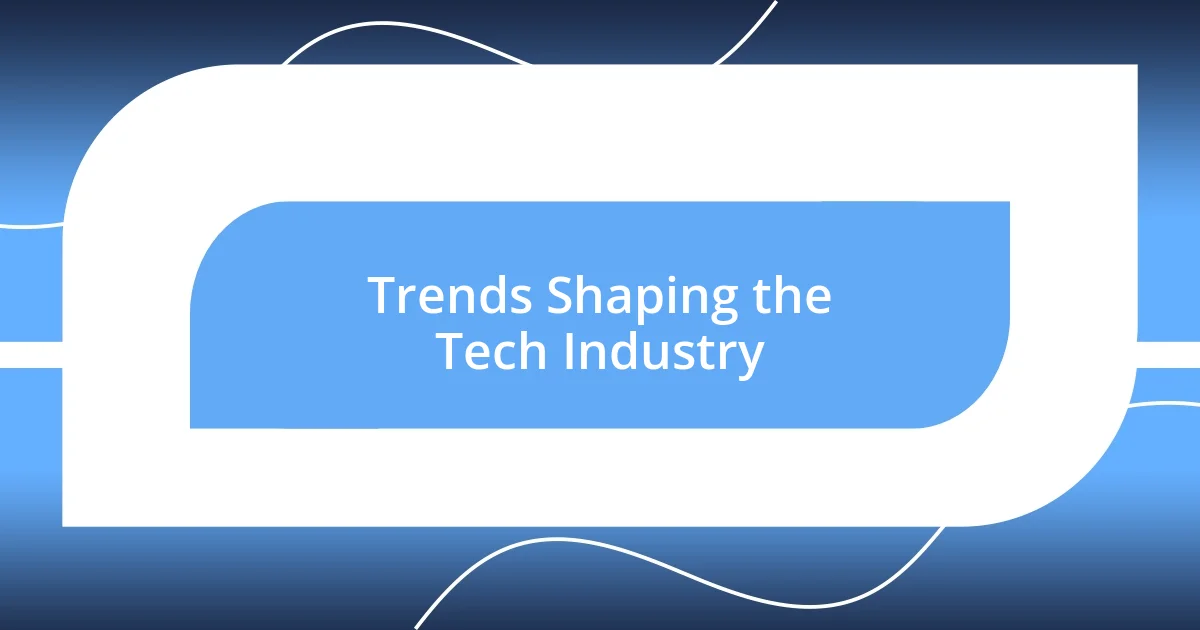
Trends Shaping the Tech Industry
The tech industry is currently witnessing a significant shift towards remote work and hybrid models. During a recent conference, a panel discussed the challenges and benefits of this trend. I leaned in as they shared how this new flexibility not only improves employee satisfaction but can also lead to increased productivity. Have you ever wondered how our work environments impact creativity? From what I’ve observed, providing teams with the option to work where they’re most comfortable can catalyze innovative solutions.
Another prominent trend I’ve noticed is the increasing focus on sustainable technology. A speaker shared a particularly moving story about how their company shifted to eco-friendly practices, reducing their carbon footprint significantly. This struck me—I realized that as tech professionals, we hold a responsibility to contribute positively to our planet. How often do we think about the environmental impact of our innovations? As we develop new technologies, it’s essential to weave sustainability into our designs, ensuring future generations can thrive.
Finally, there’s a rising emphasis on the importance of mental health in the tech sphere. During a breakout session, a fellow attendee shared their personal struggle with burnout, which resonated with many of us in a room full of tired but ambitious professionals. It’s fascinating how these conversations can pave the way for a healthier work-life balance, don’t you think? I believe it’s crucial for us to prioritize mental well-being and create supportive environments where creativity can flourish without the weight of overwhelm.
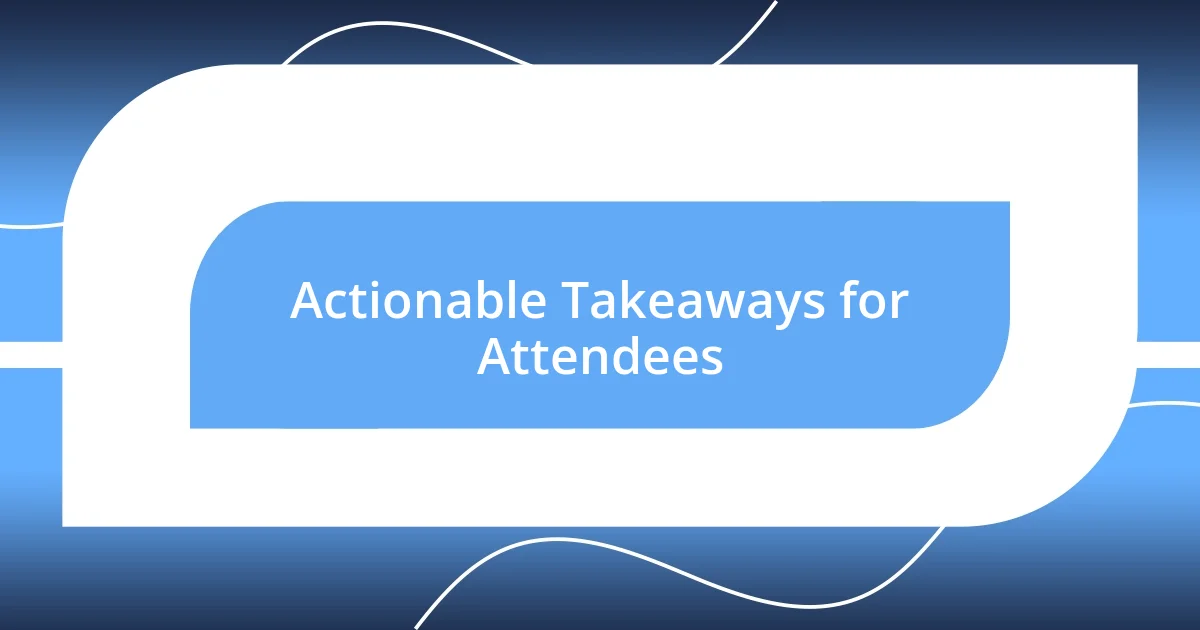
Actionable Takeaways for Attendees
Actionable takeaways from tech conferences can transform your experience into tangible benefits. In my early days attending these events, I’d often jot down quotes and insights, making them my mantra for the weeks ahead. For instance, when a panel discussed the importance of networking, I took a leap of faith and approached someone I admired after the session. That simple act led to a mentorship that has proved invaluable ever since. Have you considered how one conversation could spark countless opportunities?
Engagement is another crucial takeaway. I learned early on to participate actively, whether through Q&A sessions or connecting on social media. One time, I asked a question during a workshop that resonated with many attendees, which led to a lively discussion afterwards. That moment not only boosted my confidence but opened doors to new friendships and collaborations. So, why not make it a point to engage? I genuinely believe taking that risk of speaking up can lead to unexpected alliances and expand your knowledge exponentially.
Lastly, reflecting post-conference is key. I’ve found that dedicating time to synthesize what I learned helps me retain those insights better. After attending a session on emerging technologies, I scheduled a coffee chat with fellow attendees to discuss our thoughts and strategies in-depth. These discussions illuminated new perspectives that I hadn’t considered during the sessions. How often do we carve out time for reflection in our busy schedules? I invite you to make it a priority—it truly deepens the impact of your conference experience.
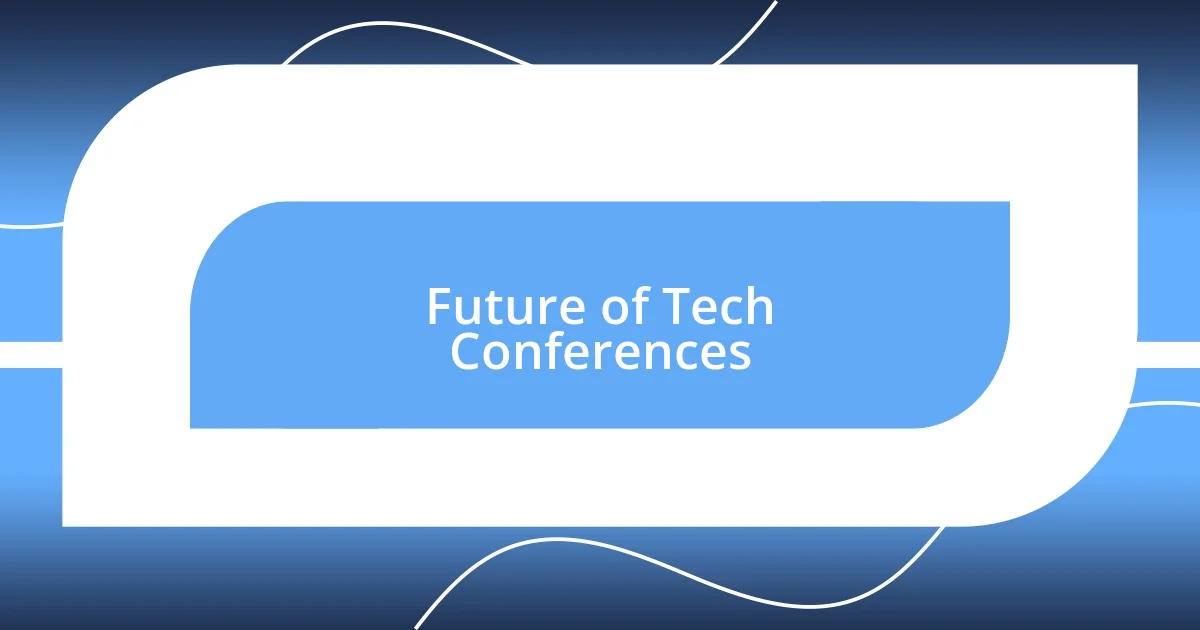
Future of Tech Conferences
The future of tech conferences is bound to evolve dramatically, especially as we embrace virtual and hybrid formats. I attended an event recently that seamlessly blended in-person and digital participation, allowing global accessibility that simply wasn’t possible before. Imagine engaging with industry leaders from the comfort of your home—how liberating is that? This shift not only expands audiences but also diversifies discussions, bringing in voices and perspectives that might otherwise be overlooked.
I also see a growing trend toward interactive and immersive experiences at these gatherings. At one conference, I was blown away by a session that used augmented reality to demonstrate new tech products. This hands-on approach transformed passive viewing into an engaging learning experience. Have you ever thought about how much more we retain information when we actively participate? I believe that this level of interactivity will become the norm, making each conference feel like a collaborative workshop rather than just a series of lectures.
Finally, I think we can expect to see an increasing emphasis on community-building within the tech space. During a recent forum, the focus was on fostering connections, not just by exchanging business cards but by genuinely supporting one another’s projects. It struck me—how powerful it is when we shift our mindset from competing to collaborating. As we move forward, nurturing these relationships could lead to groundbreaking partnerships. Are we ready to redefine what success looks like in our industry?


